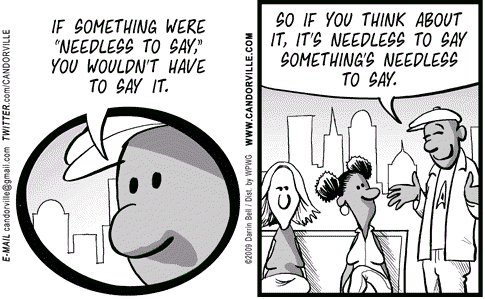 Do not write
(or say) the following phrases:
Do not write
(or say) the following phrases:SOME OF BARRY FRIEDMAN'S RULES ABOUT PAPERS, ASSIGNMENTS, AND EXAMINATIONS THAT HE USED TO THINK "GO WITHOUT SAYING"
 Do not write
(or say) the following phrases:
Do not write
(or say) the following phrases:
● “It goes without saying that . . .”
● “Needless to say, . . .”
● “When it comes to . . .”
● “As such, . . .”
● “With that in mind, . . .”
● “That said, . . .”
● “With that being said, . . .”
These phrases annoy your instructor to no end and may affect the
grade on your paper. The first two
are “golden oldies.” The last three have
crept into the language fairly recently (I don’t know how or why).
F
● “America”: Do not refer to the United States as "America." When you are referring to the country and using it as a noun, write "United States" (not "U. S."). However, when an adjective is necessary, "American," "United States," and "U. S." are all generally acceptable. It is correct to refer to a U. S. citizen as an "American."
● “amongst”: use “among” instead.
● “based off of”: use “based on” instead.
● “different”: Please reserve the word "different" to indicate an actual dissimilarity; e.g., "So that I could watch football on Sunday, I went to church on a different day." When referring to a variety of items, I prefer to use the word "various" to indicate that they are separate and distinct. "One can play various games using a deck of playing cards." Compare these two sentences: (1) "Three different people sent birthday cards to me." (2) "Three people sent birthday cards to me." Don't they mean the same thing? Isn't the word "different" redundant? Can two people ever be the same people rather than being "different" people? Whenever one uses the word "different," the context should specify from what the thing is different. Instead of saying, "I accepted a different challenge today," say, "I accepted a new challenge today."
|
Theodore M. Bernstein, late assistant managing editor of The New York Times, providing guidance to Times reporters (Watch Your Language, New York: Pocket Books, 1965): |
|
DIFFERENT. “Describing the bribery plot, the prosecutor said that two different men had approached Mr. Jones in his room at the Plymouth Hotel . . .” Naturally, the two men were “different”; what was meant here, apparently, was that two men approached Jones on different occasions (p. 21).
DIFFERENT.
“He also said ‘different witnesses’ than
those who testified before the original grand jury would be called
. . .”
The misuse of “than” after
“different” apparently follows the analogy of “other,” but it should
be remembered that “different” is different from “other.”
“Different than” is variously
described by the authorities as “colloquial” and “incorrect”
(pp. 108‑109). |
● “emplace”
● “exemplify”
● “feel”
● “if”
● “illustrate”
● “instate”
● “oftentimes”: use "often" instead.
● “public eye”: please avoid
the use of this and similar
● “with”
● “within”
 Never submit a paper or
other assignment to the instructor until
you have examined it. It is
risky to turn in a paper that you have just plucked from the printer, pulled out
of a book bag containing various papers, etc.
Look the paper over to make
sure that it’s the correct paper (and the correct version), that it is a
complete copy, that it is legible,
etc., before you submit it.
The paper or other assignment that you submit is the one that will count‑‑for
you or against you.
Never submit a paper or
other assignment to the instructor until
you have examined it. It is
risky to turn in a paper that you have just plucked from the printer, pulled out
of a book bag containing various papers, etc.
Look the paper over to make
sure that it’s the correct paper (and the correct version), that it is a
complete copy, that it is legible,
etc., before you submit it.
The paper or other assignment that you submit is the one that will count‑‑for
you or against you.
Make sure that anything that you submit for credit is
legible.
Your instructor will give you
no
credit for anything that he cannot read.
He will not invite you, once he
has graded what you wrote, to help him decipher it.
If you have a problem with handwriting clearly, etc.,
alert your instructor in advance
so that the two of you can work out an accommodation.
Return to Barry Friedman's home page . . .
Created by Barry D. Friedman on May 27, 2014; last revised on July 10, 2019
.
.
.